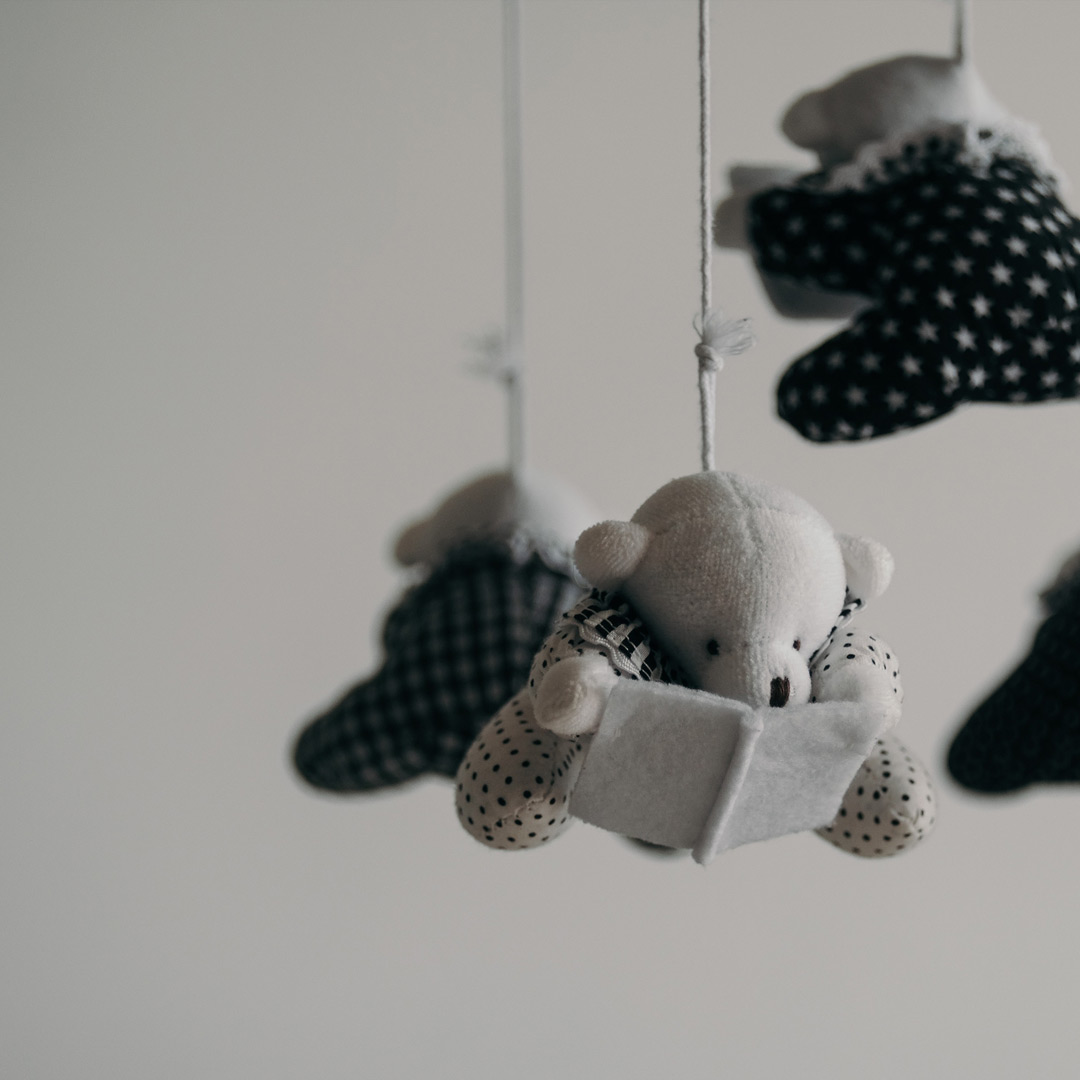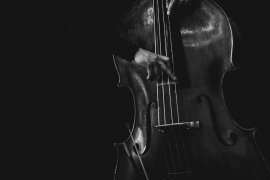WEARING A HOUSECOAT STAINED WITH BRISKET AND BORSCHT, my grandmother stands in the doorway blocking the light. She spits three times, mutters pu pu pu, mumbles a prayer. When she’s finished, she cups my chin in her shaky hands.
“No matter vat you do, the baby vill be fine,” she says. “Children survived Auschwitz, Fraidy. They can survive you.”
The baby’s slung over my shoulder. I pat Hannah’s back, dance a little two-step, then prepare myself for more. Every day my mother, aunt and grandmother march into my home toting Tupperware filled with food. It could be ninety degrees in the shade, the Miami heat soupy with humidity, still they wear sweaters. Then under the air-conditioning vents they huddle, muttering curses, their eyes scanning the window for enemies only they can see. Theirs is a litany of heartache. A Greek chorus wearing support hose and orthopedic shoes.
My Aunt Esther chimes in next. Born a widow, bathed in black, she’s lived with my parents her whole life.
“Cloth diapers or plastic. Breast or bottle. Nanny or day care. Such decisions!”
Finally, my mother steps out of the shadows. A clone of my grandmother only worse. Her hair’s a helmet, sprayed and lacquered at the beauty parlor from one week to the next. Elastic waist paints. A blouse as large as a circus tent billows.
“If only I had the luxury to agonize over such decisions!”
***
“No matter what,” says Ira, “I’m sure you’ll make the right choice.”
The moment I’ve been dreading is fast approaching. My four months of paid maternity leave has three weeks left to go. I’ve got a spot saved at the best day care in town, but my heart still lurches at the thought. It’s like a penitentiary, the rows of cribs, the toddlers rattling the bars, the cries for help. But while my husband has my bags packed, his staying home is not an option.
“I’m just not good at the mommy thing,” he says. “The burping, the changing, the feeding.”
My work at the law firm demands a sixty-hour week. But Ira’s a realtor, and the housing market’s been inconsistent at best. God knows his schedule’s flexible. There’s always time for the gym, for Starbucks, for power lunches at the swankiest restaurants in town. With a little rearranging, we both know he could swing it. Still he dithers.
“Women are so much better at this stuff than men.”
***
“No matter what you do,” says my friend Marcy, “they finagle their way around it.”
We call it intentional stupidity. The way our husbands pretend to be far more incompetent then they are.
We’re both talking from our respective kitchens. There’s a lot of noise in the background at Marcy’s house. A kid’s crying. The TV’s blaring. Marcy’s speaking on speakerphone, nursing her five-month-old, and stirring a pot on the stove at the same time.
“Last week, Scott stuck an oral thermometer up the baby’s butt,” says Marcy. “Then he fed little Mikey nachos. What kind of an idiot feeds a two year old nachos? So of course Mikey’s up half the night with diarrhea. Stupid, I tell you. They purposely make themselves stupid!”
We call it intentional stupidity. The way our husbands pretend to be far more incompetent than they are.
Ira graduated from college. Made the President’s Circle three times at his office. Yet he still can’t figure out how the tape works on Hannah’s Pampers. He might as well put her down naked for all the good it does. Now it was my turn to vent.
“Last week I needed a few things at the grocery, I was gone for an hour tops. Guess what I come home to? Poop on the sheets….poop on her onesie…poop in her hair….”
Marcy’s voice is surging in and out. Scott, it’s time for Sesame Street. Scott, can you change the channel on the fricking TV!
“Our husbands are geniuses,” says Marcy, “when it comes to acting dumb.”
***
“No matter who we send your way,” sniffs the lady at the agency, “you find something wrong.” She counts down on her fingers. “You already interviewed how many nannies? A dozen?”
I answered each knock on the door with the best of intentions. Then I’d turn the knob and slowly slowly slowly peek outside. Each first impression failed to impress. The biker who smelled like cigarette smoke….the fat one who wheezed…the stoner with the tattooed arms and purple hair. A parade of losers—all of them.
Okay. Expecting Mary Poppins may have been unrealistic. But I’d like someone dressed in sensible shoes who at least has all of her teeth.
***
Carmen looks to the heavens. “No matter what,” she says, “God will provide.”
Suddenly, our once a week housekeeper is a possibility. Short and sturdy, Carmen’s a neighborhood fixture. She comes from a Cuban family of legal/illegal/and willing to negotiate immigrants. Sure her English’s iffy. But she irons Ira’s shirts with origami precision and attacks the floor with a mop.
“I raised my kids, my sister’s kids, my brother’s kids,” says Carmen. “I clean. I cook. One kid’s nahting.”
“What happened to your other jobs,” I ask her? “Your Monday, Tuesday, Thursday, Friday jobs?”
Her black eyes sparkle as she negotiates. Her leathery fingers wave in the air. “If you pay me the right money…those other jobs, they disappear.”
***
“No matter how you slice it,” says the manager of the Jewish Community Center, “there’s no day care center better than ours.
The slot at the JCC needs a commitment soon. I drive into the parking lot with my pulse thumping. There’s a lake dotted with ibises and cranes, swaying palm trees and manicured hedges. The security’s like Fort Knox. A guardhouse that looks like a miniature hacienda stands front and center. A guy with a gun on his hip checks my driver’s license. Then he peeks underneath the car.
Once inside, I walk down the halls and hear basketballs bouncing, see a yoga class stretching behind glass doors. But the day care center is in its own private building, a mini campus surrounded by a lush green lawn. The pastel-colored rooms are sorted by age. Everything is neat and sunny. The Hebrew alphabet dangles from the ceiling while pictures of Israel grace the walls. A worker by the name of Miss Susan gives me a tour. Blonde and perky, she looks around ten years old.
“We’re open from six in the morning until eight at night,” she says. Her hand quickly covers a yawn. “Working moms love us. Everyone loves us.”
Three toddlers are running around with runny noses. A boy’s in the corner scratching his ass. My pediatrician hates day care centers, says that day care centers keep him in business, says that they’re like petri dishes, like veritable cesspools of germs. So I scrutinize every bruise and every blemish. That cough. Is it bronchitis? That funky sore. Is it impetigo? But everyone looks happy and everyone looks clean.
I’m ready to sign on the dotted line when a cute little girl, twoish I suppose, runs up to my tour guide. “Mommy! Mommy!” she blurts as she buries her little head in the guide’s lap.
“Your daughter is just adorable,” I tell her.
She looks at me and blinks. “Oh, Kylie’s not mine. I’m not even married.” Then she circles the room with her hand. “They all think we’re their mommies. Isn’t that cute?”
***
No matter what it takes, we’re not going to day care.
I spend the rest of the day with Hannah on my lap scanning Internet sites. Hidden cameras can feed pictures of your baby right into your cell phone. And they’re all so cleverly disguised! Inside a teddy bear. Wedged like a bookend. Stuck into the ceiling like a light. The premium models feature audio as well as video. Every burp, sigh, and giggle is recorded. You can monitor your kid’s dreams, your kid’s breathing, every waking and sleeping moment of your child’s life.
“They all think we’re their mommies. Isn’t that cute?”
For a couple hundred dollars I can be Fort Knox, too.
***
The scheme seamlessly falls into place. Carmen will watch the baby. Ira will supervise Carmen. My grandmother, mother, and aunt will provide food and backup. Suddenly, returning to work is a viable option. I fill the freezer with plastic ziplocs of blue breast milk. I buy a new wardrobe that’s one size bigger but at least it fits. And thanks to my hidden camera, there’s an invisible umbilical cord tethering Hannah to me all day long. There’s not one milestone, not one baby step that I’ll miss!
***
I ignore the conference calls, the urgent inbox, the demands big and small from my law partners. The first week back I’m useless. I lock myself in my office, pull down the shades, press the mute button on my landline phone. Then I link my computer to the babycam. My nose is inches from the monitor. Hannah’s every snort and sniffle is amplified to a roar.
Carmen’s in the baby’s room as soon as she starts to whimper. So far so good. Her hands are quick and efficient. She lifts Hannah from the crib, plants a kiss on her cheek, walks over to the changing table. With one hand, she pulls off the Pamper and dumps it in the Diaper Genie, while the other hand holds the wiggling baby still. The woman’s a magician. She’s making funny faces, cooing in Spanish, and wiping Hannah’s butt at the same time. A minute later, Hannah’s not only dressed in her cutest romper but her hair’s combed.
“It’s time for your bottle, niñita.” Hannah’s propped against Carmen’s shoulder as she leaves the room. The sound’s starting to fade but I can still make out the words. “Carmen love you. Mommy love you…. And Jesus, he love you, too.”
I make a mental note to order more cameras. Why aren’t there more cameras? Another three hours go by until I see the baby again. Carmen’s probably toting her from room to room while she cleans. Hannah’s feeding chair is in the kitchen, her Pack ’n Play’s in the living room, her bouncy seat’s parked in front of the TV. Finally, when it’s naptime, the two of them reappear within the camera lens. Carmen coos and pats the baby’s tummy. Within minutes, Hannah’s fast asleep in her crib.
***
An hour later the baby starts to waken. Her eyelids flutter as she opens and closes her little fists. The sun’s slitting through the curtains and throwing shadows on the wall. She should be crying. Why isn’t she crying? Instead Hannah kicks her little feet and purses her mouth into the sweetest of smiles. She’s looking around. A mobile with stuffed animals twirls above the crib while a prism of light dances on the ceiling.
The milestone is subtle yet it’s there. Hannah’s diaper’s wet, she’s probably starved, yet she’s taking the whole world in. Suddenly life is larger than eating and burping and pooping. My baby girl is listening and watching, receptive to every possibility that comes her way. Tears stream down my cheek. The moment is a gift, something I want to freeze in time, something I want to savor.
Then the three of them barge into the room.
My grandmother speaks first. “No matter vat anyone else says, that child’s the spitting the image of Fraidy.”
“The eyes. The mouth. The nose,” says my aunt. “Especially the nose.”
“Don’t worry,” says my mother. “When she’s sixteen, we can have it fixed.”
Suddenly life is larger than eating and burping and pooping. My baby girl is listening and watching
***
The plan was for Ira to take over at 5 o’clock. The baby monitor reads 5:18 when he finally opens the nursery door. It’s Hannah’s cranky time. Carmen– her hair mussed, her shirt stained– passes her off like a football on the third down. Hannah wants to sleep but needs to stay up another hour or so. The goal is to entertain her as long as you can.
Ira kicks off his shoes, grabs a book from the bookshelf, and sits down on the rocking chair. Hannah’s in his lap. She’s chomping on her pacifier while her body twists and turns. Meanwhile Ira can’t get comfortable. He rearranges her legs, his legs, the book, her arms, his hands. Then finally he starts reading.
Once there was a little bunny who wanted to run away.
The baby’s starting to whimper.
If you run away, said his mother, I will run after you.
Hannah’s dropped the pacifier but each time Ira tries to plug it in she spits it out. Her face turns red. His face turns redder. Any second full-blown bawling will ensue. Ira’s starting to panic. He’s looking around the room for a lifeline or an escape route–but no one’s there. The book’s dropped on the floor. Still he pretends to read it.
If you run away, he tells the baby, I will spank you.
A twitch in Ira’s eye starts to gravitate. Soon his neck is twitching, too.
If you run away, I will lock you in your room for the rest of your life.
By now his shoulder’s yanking up and down like someone’s stuck in a stick and pulled. The rest of the image is blurry. The sun’s setting and there’s more shadow in the room than light. Between the baby crying and Ira yelling, the audio feed is white noise, a jumble of human frustration, a cacophony of pain.
***
No matter what I say or do, does it really make a difference?
A week later, thanks to a generous gift to the JCC, Hannah is enrolled in day care. I drop her off on the way to my office and pick her up on the way home. Carmen misses her. My grandmother, aunt, and mother only see her on the weekends. And Ira squeezes in baby time whenever he can. Like a camera lens, our world adjusts in and out, trying on new realities for size.
So what if we’re dependent on the kindness of strangers. You have to make that leap of faith sometime, right? Especially when strangers are no stranger than the people you know and love.
Marlene Olin was born in Brooklyn, raised in Miami, and educated at the University of Michigan. Her short stories have been published or are forthcoming in journals such as The Massachusetts Review, Prime Number, Upstreet Magazine, The American Literary Review, and Arts and Letters. Her stories have been nominated for the Puschart as well as the Best of the Net prizes, and for inclusion in Best American Short Stories. She is the winner of the 2015 Rick DeMarinis Short Fiction Award.
New stories every Monday, delivered straight to your inbox.
Drop your email below to get them >>>




